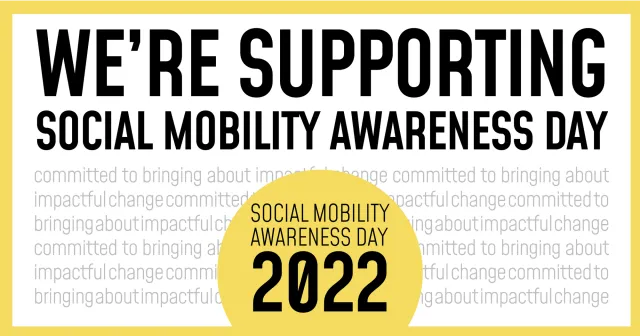This week, the first Social Mobility Awareness Day takes place, designed to promote wider conversations about social mobility.
In light of this, Rosa Alonso, Senior Researcher at the Social Mobility Commission has been reviewing data from the 2021 British Social Attitudes Survey (BSAS). Running for nearly 40 years, the survey is an important barometer of public attitudes (see below for more information).
Her findings paint an interesting picture on the public’s perception on social mobility and social class.
Perceptions of social mobility
Asked the question ‘thinking about people in general, which of the following is most important?’, in general, three times as many respondents think that it is more important that people from more disadvantaged backgrounds become better off than their parents (45%) than as many people as possible become better off (14%).
When we look at these findings taking into account the occupational background (professional, intermediate or working class occupations) of the respondents we see a slight variation:
- People in working class occupations are slightly more likely to respond that it is important that as many people as possible become better off than their parents compared to those in professional occupations (16% vs 12%).
- However, half of the respondents in professional occupations felt it is important that people from less advantaged backgrounds become better off than their parents, compared to only a third of respondents who are employed in working class occupations (50% vs 37%)
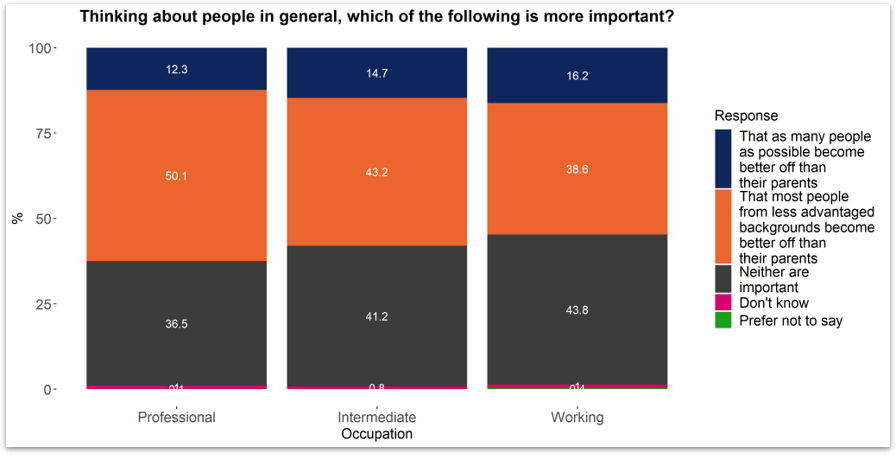
However, most strikingly 40% of respondents think that neither are important. The response to the next question may shed some light on why that is.
Drivers of a better life
Parents will often say they want a better life for their children – but have you ever wondered what they are wishing for? The survey participants were asked to best describe what they thought a better life would be – for instance being healthier than their parents or having a better education than their parents.
Perhaps unsurprisingly, given the survey was conducted 18 months into the COVID-19 pandemic, health (55%) was the most popular answer, followed closely by education (52%), with more than half of the people selecting these as their favoured options. 42% of the respondents wanted to see children having better working conditions than their parents.
A much lower percentage of people selected having more money than their parents (18%), a better job (15%) or having a better home (14%) as what would lead to a better life. This may seem like a surprising finding, but one theory might be that those who selected ‘better education’ feel that would naturally lead to additional better outcomes like a better job, with more money and a better home anyway.
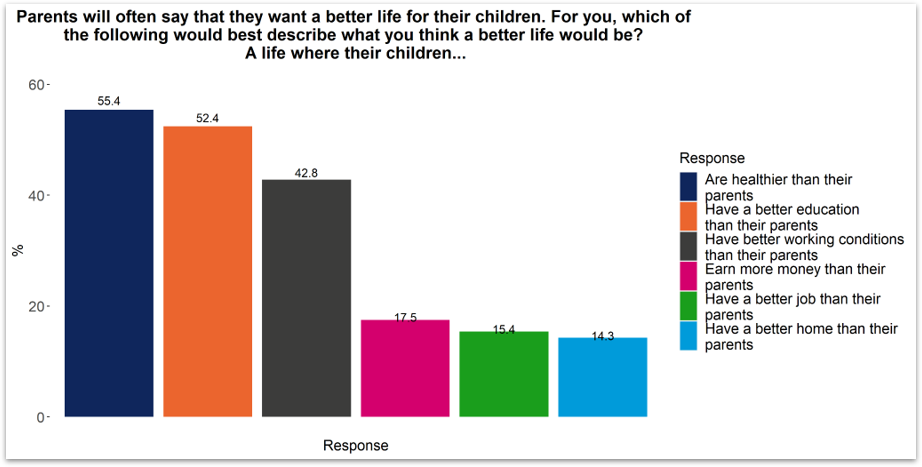
Looking at the breakdown of this question by age, we see a marked difference in responses to some of these categories, including:
- Double the amount of participants in the youngest age range (18-24), compared to those in the older age range (65+), think it is more important that children should:
- ‘earn more money than their parents’ (23% vs 10%);
- have a ‘better job than their parents’ (23% vs 12%)
- And almost three times as many young people think it is more important to have a ‘better home’ than their parents compared to the oldest age range (23% vs 8%)
- However, when it comes to health, those in the older age range are 1.5 times more likely to think this is more important that those from the youngest age range (66% vs 44%)
Moving social classes
The respondents were asked how difficult they thought it was for people to move from one social class to another. Again, based on our respondents age we see a marked difference in these responses.
The graph below shows that as the age range increases, the number of people thinking it is not difficult also increases, with the amount between the lower age range and highest age range trebling from 8% to 27%.
Of course, this doesn’t necessarily mean things are getting more difficult over time (we’ll be looking at whether this is the case in our report, out soon). What it does show is that young people think they are – this could be for a range of reasons including changing expectations, or even a result of different perspectives – i.e. things may seem more difficult for those starting out on their career journeys, compared to those looking back who’ve already completed them.
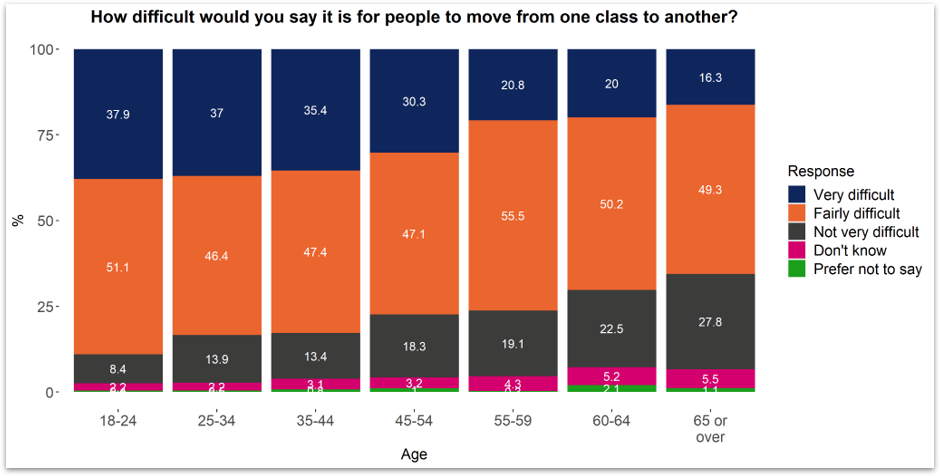
Nonetheless, it must be noted that in general 77% of respondents think that it is very or fairly difficult for people to move from one social class to another, increasing to 89% for those respondents aged 18-24 but dropping almost 20 percentage points to 70% for respondents aged 65 and over.
Differences between social classes
When asked ‘how wide do you think the differences between social classes are in this country’, 83% of the respondents think that the differences are very or fairly wide. We don’t see many variations on this figure between those respondents from different geographical regions.
However, looking more closely at those responding ‘very wide’, 38% of all respondents believe that to be the case, rising to 54% of those from the North East citing ‘very wide’.
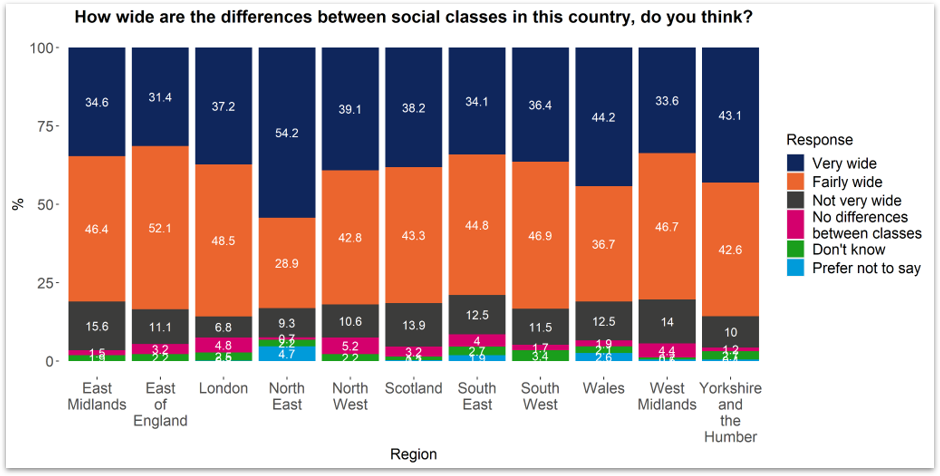
It would be interesting to look at the reasons for the variation in these perceptions, and how closely these match reality. Our State of the Nation report due to be published next week will start to do that, and in the coming year we plan to publish more data broken down by geographical region.
What do you think about these questions? Join the conversation on our social channels.
Further information on the British Social Attitudes survey (BSAS):
- The survey is conducted by NatCen Social Research.
- Running annually since 1983, the survey asks around 3,000 people each year what it’s like to live in Britain and what they think about how Britain is run. Since the start, more than 100,000 people have taken part in the survey.
- The survey informs the development of public policy and is an important barometer of public attitudes used by opinion leaders and social commentators.
- We are reporting statistics collected for the 2021 survey – with the fieldwork carried out between 16 September and 31 October 2021.
- For the social mobility and social class questions used in our findings above, the sample size was 3,118.
- Weights have been applied in our analysis in order to show representative results of the population.
- BSAS 38 report (2020) can be found here. Full findings for the BSAS 39 (2021) data will be published by NatCen Social Research later in the year.
Want to join in the conversation on Social Mobility Awareness day? Visit Making the Leap’s resources and share your own activities on social media using the hashtag #SocialMobilityDay
